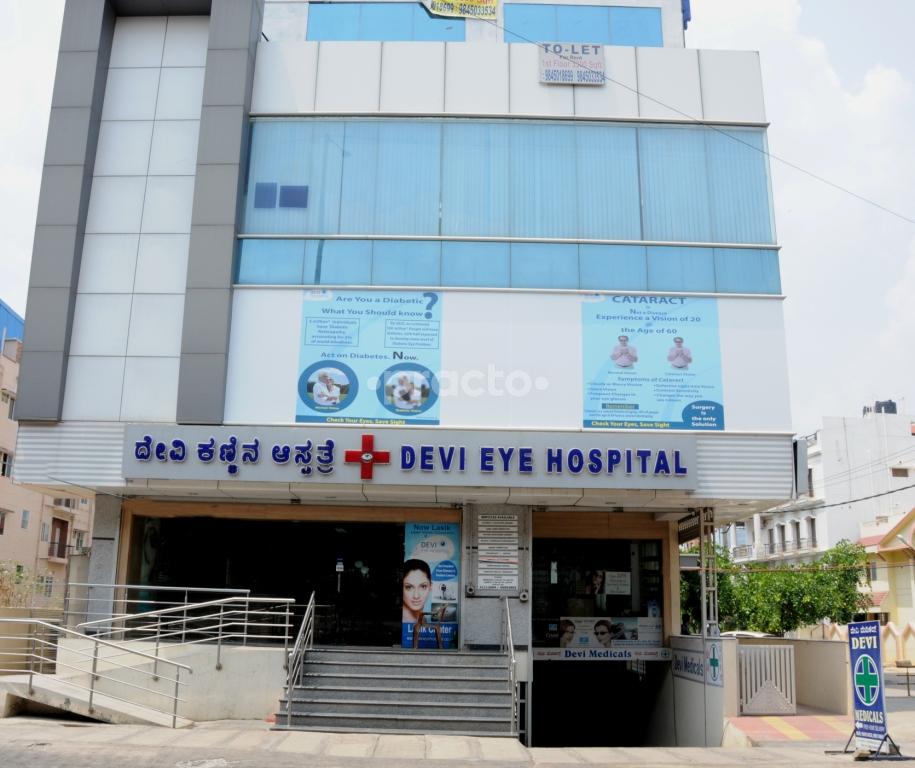Top 10 Best Ophthalmology Hospitals in Bangalore

Top 10 Best Ophthalmology Hospitals in Bangalore
What is Ophthalmology?
The study of eye-related medical diseases is known as ophthalmology. Ophthalmologists are doctors who specialise in the medical and surgical treatment of the eye.
This is a common practice. Your doctor may refer you to an ophthalmologist if you have symptoms of cataracts, eye infections, optic nerve problems, or other eye illnesses.
In this article, we’ll look at what ophthalmologists do, including the conditions they treat, the procedures they perform, and when someone would need to see one.
What is an ophthalmologist?
An ophthalmologist is a doctor who specialises in diagnosing and treating eye diseases.
Ophthalmologists must meet the following requirements to practise in the United States:
- Four-year college education and a medical degree are required.
- A one-year post-doctoral clinical year
- At least 36 months of ophthalmology-focused residency training
- Written and oral tests are required for certification with the American Board of Ophthalmology.
Some ophthalmologists pursue fellowship study in one of the many ophthalmology subspecialties for a year or two, such as:
- glaucoma
- the iris of the eye
- the retinal ganglion cells
- uveitis
- surgery to correct refractive errors
- paediatrics
- neuro-ophthalmology
- Reconstructive and plastic surgery
- Ocular oncology is the study of cancers of the eyes.
Subspecialist ophthalmologists have often received training to focus on complex eye disorders, those that affect a specific eye region, or those that affect certain patient groups. They also receive more intense training than regular ophthalmologists in order to do extremely difficult surgery on the delicate components of the eye.
What conditions can they assist with?
Ophthalmologists are responsible for identifying, preventing, and treating virtually all eye disorders and vision impairments.
Subspecialist ophthalmologists, on the other hand, are more likely to diagnose and treat specific issues. such as:
- glaucoma
- Retinal illnesses include macular degeneration and diabetic retinopathy.
- corneal problems
- cataracts
- cases involving children or youth eye issues cases having a neurological cause or component, such as optic nerve abnormalities, aberrant eye movements, double vision, and some types of vision loss cases involving children or juvenile eye conditions
- situations involving extensive vision repair or reconstructive surgery
An ophthalmologist’s medical education may help them to spot indicators of disorders that are not directly related to the eye, in addition to caring for the eyes and eyesight. In such cases, they can refer consumers to the appropriate treatment.
Many ophthalmologists actively participate in a scientific study to determine the causes of eye and vision disorders and potential treatments.
What are the methods that they follow?
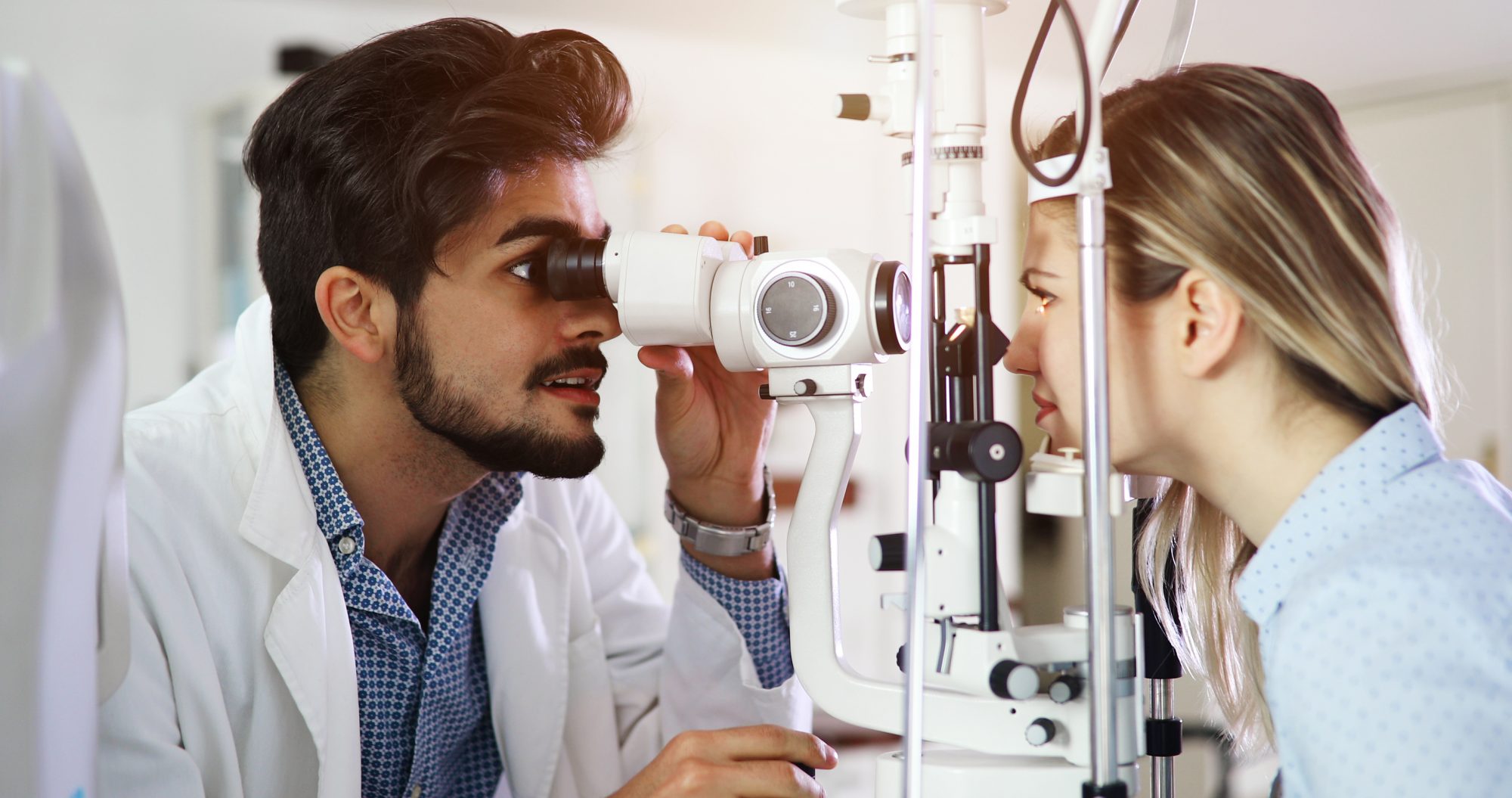
The majority of ophthalmologists have received training and certification in a wide range of medical and surgical procedures. The operations of an ophthalmologist are routinely decided by a variety of factors, including the practise and specialty in which they practise.
The most common procedures an ophthalmologist undertakes on a daily basis are diagnosing and monitoring moderate eye and vision diseases. They’ll also devote time to prescription and fitting glasses and contact lenses for vision correction.
Daily, subspecialist ophthalmologists prefer to execute fewer procedures, focusing instead on treating one or a few related disorders.
Subspecialists frequently undertake the following procedures:
- Moderate-to-severe eye disease diagnosis and monitoring
- surgery to remove cataracts
- surgery for glaucoma
- eyesight correction by refractive surgery
- treatment for cancer
- Reconstructive surgery to correct congenital disabilities or injuries, such as crossed eyes
- Infections or obstructions in the tear ducts that are chronic or severe
- removing a neoplasm (tumour, cyst, or foreign item)
- Cases involving other illnesses, such as diabetic retinopathy or immunological disorders, may be monitored or consulted.
- injections around the eyes and face to change the function and look of the facial structure, healing injured or detached retinas
- transplantation of the cornea
When should you consult an ophthalmologist?
The majority of people visit an ophthalmologist because they have chronic or severe vision issues or indicators of eye disease, such as:
- eyes that bulge
- the vision that is blurred, distorted, obscured, or double
- ripping excessively
- defects or difficulties with the eyelids
- near lights, perceiving colourful rings or halos
- eyes that are misaligned
- floaters are black specks or strings that appear in the field of view.
- viewing bright flashes
- inexplicable redness in the eyes
- Peripheral vision loss
If you have any of the following symptoms, you should see an ophthalmologist every once.
- eyesight loss or changes that occur suddenly
- Eye pain that is sudden or severe
- harm to the eye
A person may be referred to an ophthalmologist if they have conditions or factors that enhance their chance of developing eye problems, such as:
- blood pressure that is too high
- diabetes
- a history of eye problems in the family
- HIV
- Graves’ disease, for example, is a thyroid disorder.
A family doctor, paediatrician, emergency room doctor, or optometrist is frequently referred to an ophthalmologist.
According to the American Academy of Ophthalmology, people should undergo a comprehensive medical eye exam by the age of 40 to allow an ophthalmologist to build a baseline profile of their eye health.
It is critical to have an eye health baseline because it helps practitioners to more quickly observe and track changes in the eyes or vision, which are sometimes subtle and difficult to detect. Even those who are otherwise healthy can acquire serious eye problems at any time.
Other eye doctors

Optometrists and opticians, unlike ophthalmologists, are not medical doctors. Members of all three professions, on the other hand, can and frequently do work in the same office or practise.
Primary vision care is provided by optometrists, who are eye doctors who specialise in primary vision care. Optometrists have completed a Doctor of Optometry (OD) programme, which consists of 3–4 years of college followed by 4 years of optometry school.
While the operations that optometrists undertake differ by state and by specific practises or clinics, the majority of them:
- carry out vision tests and eye examinations
- Corrective lenses are prescribed and dispensed to help manage and monitor vision changes.
- recognise symptoms of illnesses requiring subspecialist treatment, such as glaucoma and cataracts
- prescribe drugs to aid in the treatment of specific ailments
Opticians are a specific category of medical technician. They have received particular training to assist in the design, confirmation, selection, and fitting of corrective vision equipment such as contact lenses and eyeglass lenses and frames. Opticians are unable to diagnose or treat problems and must rely on optometrists and ophthalmologists for prescriptions and instruction.
Other eye doctors that commonly collaborate with ophthalmologists and optometrists include:
- Ophthalmic medical assistants: these technicians support ophthalmologists by performing a variety of exams.
- Technicians in ophthalmology: Ophthalmologists use these more highly trained or experienced medical assistants to assist them with more difficult examinations and modest office procedures.
- ophthalmic photographer: these experts utilise specialised cameras and photography techniques to capture images of the eyes that aid in the documentation of eye diseases.
- ophthalmic Registered nurses: have specialised nursing training and can assist ophthalmologists with technical activities such as aiding with procedures and injecting drugs.
Top 10 eye hospitals in Bangalore:
Eye strain, hazy vision, dry eyes, headaches, difficulty focusing at a distance, and neck, back, and shoulder pain are all common side effects of staring at computer screens for too long. There are a few things you can do to keep your eyes healthy. Vitamins C and E, as well as omega-3 fatty acids, lutein, and zinc, should all be included in your regular diet. Make sure you glance away from the computer screen at the end of each work hour. Regular eye exams are also recommended to verify that your eyes are in good operating order. Many hospitals in Bangalore feature world-class eye care services and highly experienced doctors.
Here’s a list of 10 Bangalore eye hospitals that can help you if you ever have an eye problem:
1. Narayana Nethralaya
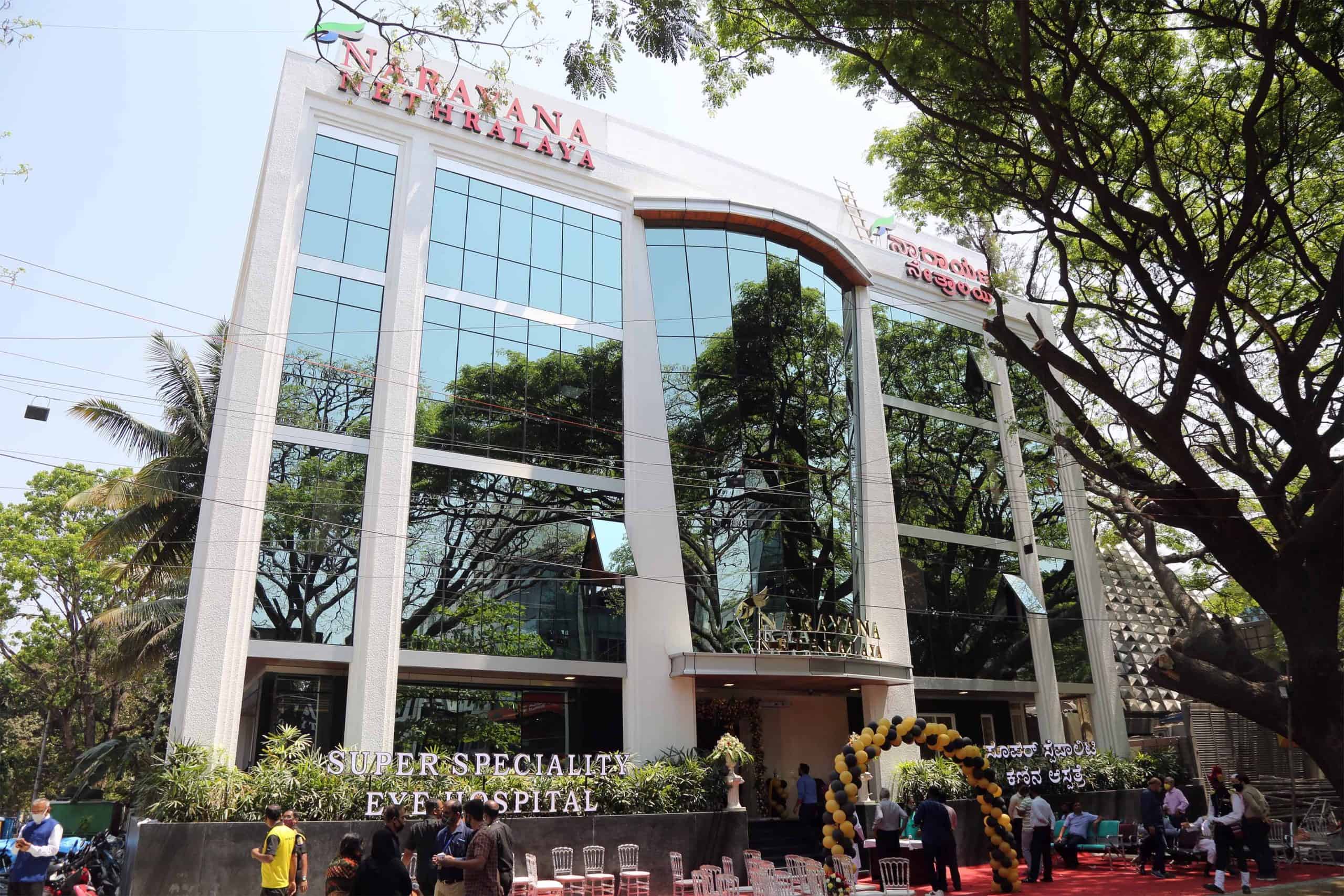
- Address: 121-C, West Of Chord Road, 1st R Block, Rajaji Nagar, Bengaluru 560010, KA
- Phone number: +91-80-66121641
Narayana Nethralaya was established in 1982 and provided the highest level of ophthalmology sub-speciality care. They are entirely equipped with cutting-edge diagnostic and therapy equipment.
They have over 3,10,000 pleased patients and have 33 years of experience in cataract surgery. They do cornea surgery using cutting-edge keratoplasty techniques such as DALK and DSAEK. To address severe diseases, this centre does Intacs and corneal collagen cross-linking. Refractive surgery is performed there without the use of blades, flaps, or discomfort.Vitreoretinal surgery, glaucoma surgery, retinoblastoma surgery, neuro-Opthalmology and electrophysiology, uveitis and ocular immunology, ocular prosthetics centre, oculoplastic and orbit surgery, and comprehensive paediatric rehabilitation are among the services they provide.
Drs. K. Bhujang Shetty, Naren Shetty, Hemamalini, and Aishwarya provide cataract and refractive surgery. Drs perform cornea and refractive surgery. Rohit Shetty and Yathish S. Dr Narendra Kumar Yadav provide Vitreoretinal services, and his team is highly skilled and experienced in performing the procedure flawlessly. Some experts here specialise in vitreoretinal surgery, paediatric ophthalmology and strabismology, glaucoma surgery, and various other eye procedures.
2. Nethradhama Super Speciality Eye Hospital
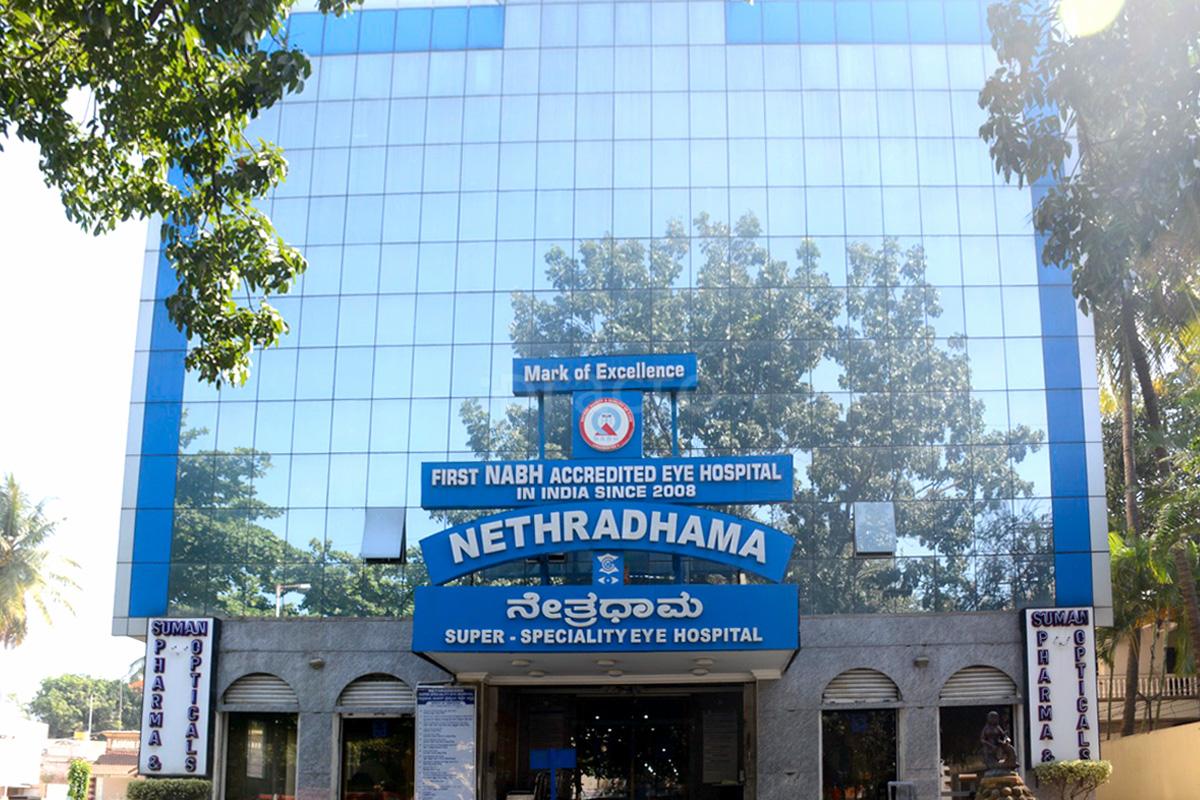
- Address – No.256/14, Kanakapura Main Road, 7th Block, Jayanagar, Bengaluru, Karnataka 560082
- Phone no – 080 2663 3533
- Email appointment@nethradhama.org
In 1994, Netradhama Super Specialty Hospital was established. They specialise in high-quality eye care, use cutting-edge technology and surgical techniques, and have competent and experienced doctors on staff. NABH, a component board of the Quality Council of India, has accredited it.
This facility provides a wide range of services, including refractive surgery, glaucoma therapy, cataract surgery, vitreo retinal therapies, and more.
Dr. Ganesh has 20 years of expertise in the field of ophthalmology. With over 20 years of experience in the sector, Dr Suman Shree R is the hospital’s director and CEO. Dr. Savitha Arun is the coordinator of electrophysiological quality assurance and the director of the anterior segment. Superintendent of Medical Services They employ a total of 37 doctors, each of whom is an expert in his or her profession.
In 2015, the state governor of Telangana gave them the prize for most patient-friendly hospital. They’ve also received the Qualtech award for process innovation. They have a charitable trust named Shraddha Eye Care Trust, which has 90 beds and has assisted many economically disadvantaged people in improving their vision and eye health.
3. Karhik Netralaya
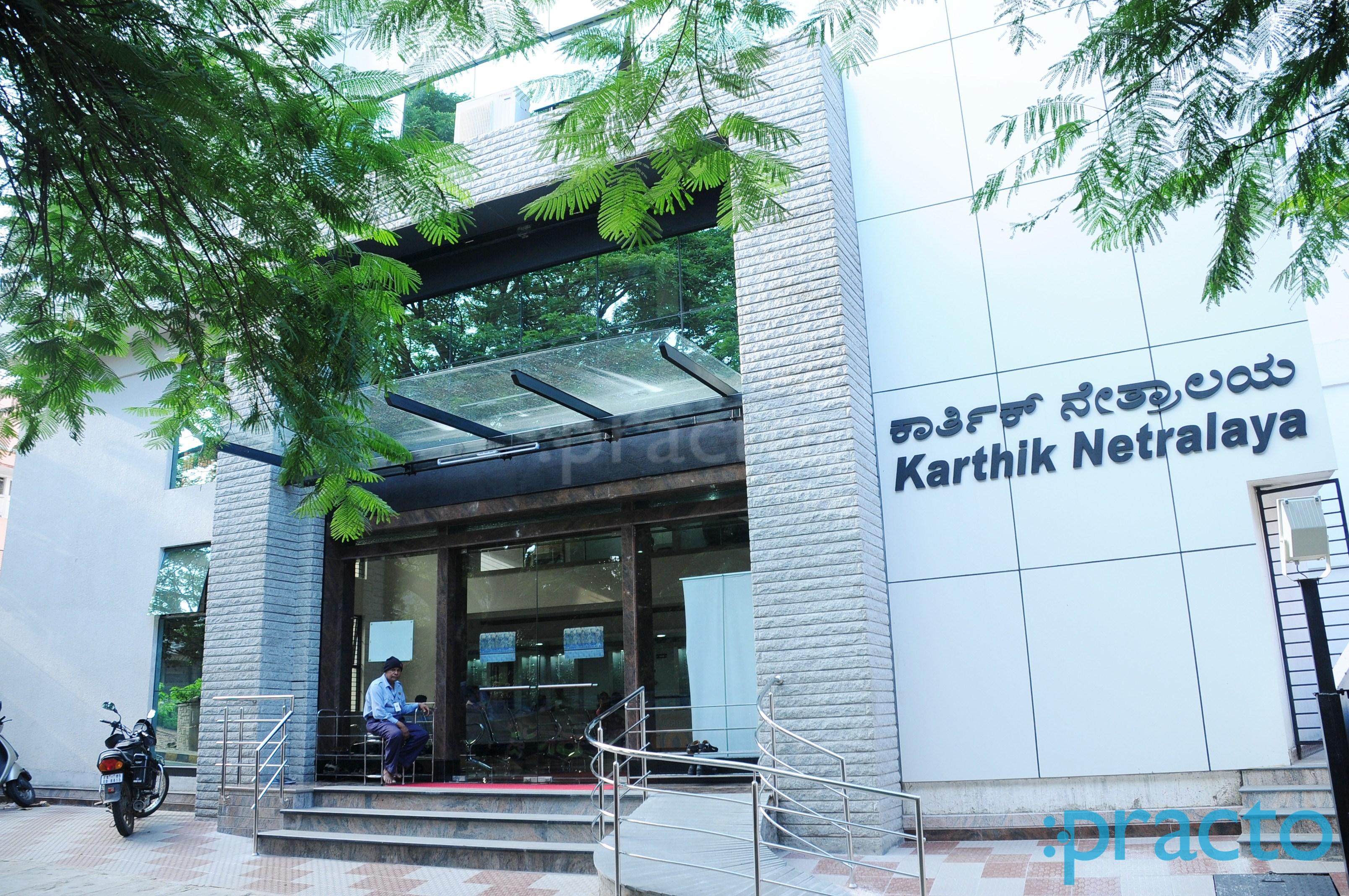
- Address – 89, 7th Cross, N R Colony, Near Bull Temple, Bengaluru, Karnataka 560050
- Phone no – 098867 89799
- Email – info@karthiknetralaya.com
It was established in 1980. They have a custom-built infrastructure, a pleasing ambience, and excellent service. Cataract microsurgery, refractive surgery, cornea surgery, Vitro-retina surgery, glaucoma surgery, squint and paediatric surgery, and vision treatment are available here.
Dr. M. S. Ravindra specialises in cataracts, corneas, IOLs, and V.R. Dr. Karthik Meda is the director and vitreoretinal consultant. Dr. Deepthi Meda is a corneal grafting, Femto laser vision correction, and contour vision correction specialist. They have five more highly skilled doctors on staff.
This facility devised and perfected Phakosection, a revolutionary and safe suture-less tiny incision approach for cataract intra-ocular lens microsurgery. They were given the distinguished service award for humanitarian activities by the Asia Pacific Institute of Opthalmology.
4. Sankara Eye Hospital
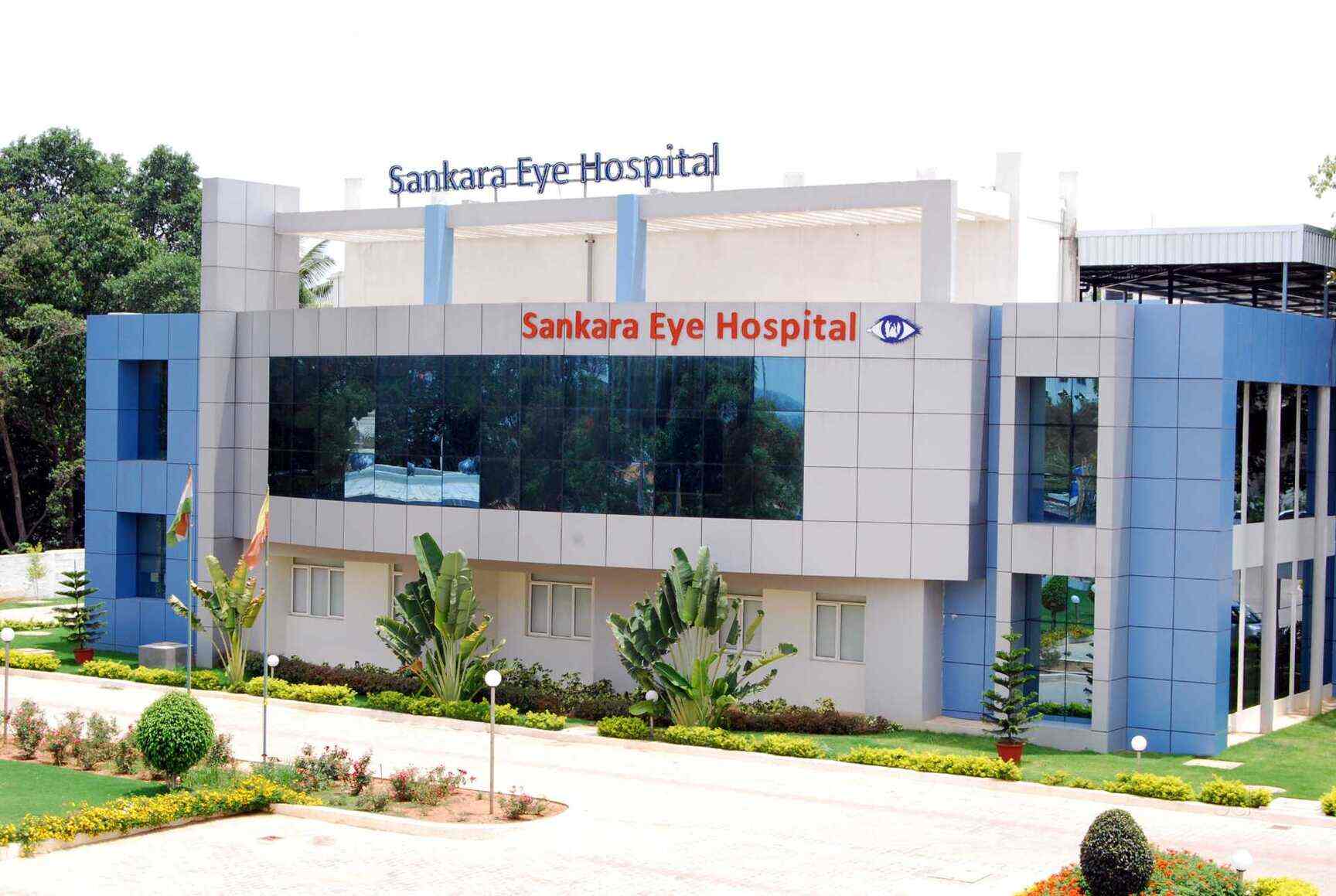
- Address – Varthur Main Road, Kundalahalli Gate, Bengaluru, Karnataka 560037
- Phone no – 080 2854 2727
It was established in 1998. They think more than 80% of blindness is avoidable and treatable at this facility.
They provide cataract, cornea, glaucoma, LASIK, ocular oncology, orbit and occupancy, uvea, vitreo-retina, and vision therapy services, as well as strabismus, uvea, and vitreo-retina services.
Dr. Y.Umesh has over 24 years of experience, and Dr. Meena Gopinath Menon is also a specialist in her field. Dr. Sowmya R is a medical doctor with 11 years of expertise. Also notable are Drs. Lalitha K.J. and Rajesh R. Another expert in the topic is Dr. Kaushik Murali.
They seek to make eye treatment free for 80% of the population. They use intraocular lenses and phacoemulsification surgery with no stitches.
5. Nelivigi Eye Hospital
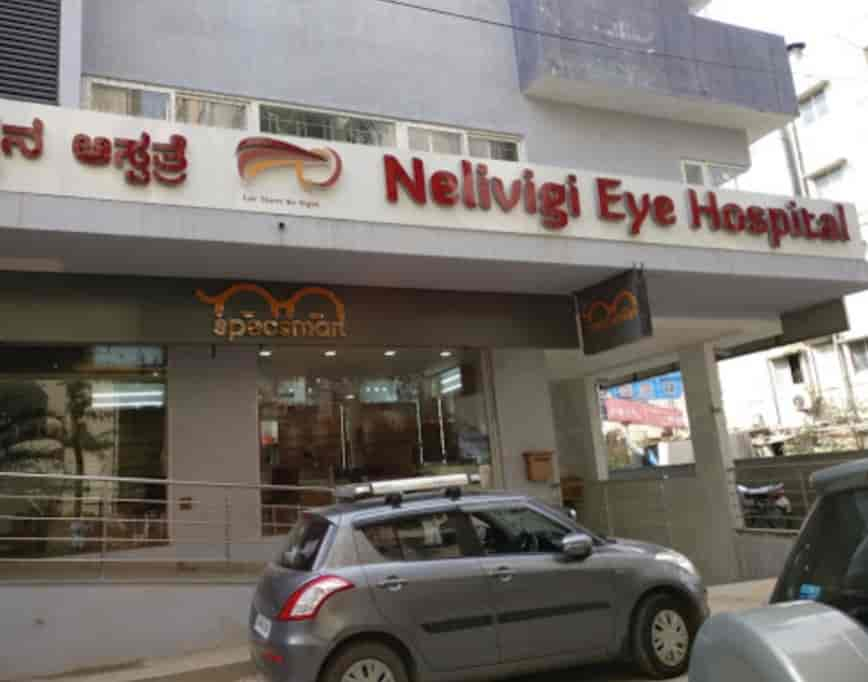
- Address – 446/21, 2nd Floor, Diagonally Opposite Bangalore Central, Sarjapur Ring Road, Bellandur Circle, Bengaluru, Karnataka 560103
- Phone no – 080 6575 6600
It is one of Bangalore’s finest hospitals, with a staff of highly trained specialists and state-of-the-art surgical equipment. It has been in operation since 2013.
Squint therapy, dry eye treatment, cataract and IOL surgery, cornea and external disease, diabetic retinopathy, Lasik and laser vision correction, macular disorders, neuro-ophthalmology, paediatric Opthalmology, and uveitis are just a few of the surgeries they’ve done.
Dr. Sirish Nelivigi has 25 years of glaucoma and cataract surgery experience. He has a lot of experience with ophthalmology. Dr. Ajay K has 18 years of experience as a senior consultant in the anterior segment and cornea refraction. They also have two other highly qualified and experienced doctors on staff.
6. Devi Eye Hospital
- Address – 434, 18th Main, 80 Feet Road, 6th Block, Opp. Koramangala Bus Depot, Koramangala, Bengaluru, Karnataka 560095
- Phone no – +91 98805 70094
- Email – devieyehospital@hotmail.com
It was formed in 1994 and houses a wide range of eye specialisations. They use cutting-edge technologies here.
Cataract, Lasik, and refractive surgery, vitreo-retina, glaucoma, paediatric and squint facilities, orbit, oculoplastic and ocular oncology, uveitis and immunology, and keratoconus are among the services offered.
Dr. Balakrishna Shetty has 30 years of experience as an ophthalmologist. Dr. Vidya is an ophthalmologist with 16 years of expertise. Dr. GM Prakash has 19 years of experience as an ophthalmologist. Dr. Aarthi has ten years of experience as an ophthalmologist. Drs. Ashwini Ranganath, Sukhdeep Bains, and Hedge Sharat Shivaramaiah have a total of nine years of professional experience.
They have a media campaign to improve public awareness of eye diseases such as glaucoma, CVS, and night blindness.
7. Prabha Eye Clinic and Research Centre

- Address – #504, 40th Cross Road, 8th Block, Jayanagar, Bengaluru, Karnataka 560070.
- Phone no – +91 80 22444131
- Email – info@prabhaeyeclinic.com
Prabha Eye Clinic is a super-specialized ophthalmic facility that has been in operation since 1940. It’s cutting-edge, integrated, accessible, and cost-effective, with the necessary equipment on hand.
The following procedures are available: cataract surgery, keratoconus surgery, glaucoma surgery, vitreoretinal surgery, uvea and ocular inflammation surgery, neuro Opthalmology, facial aesthetics and cosmetic surgery, eye plastic and orbital surgery, ophthalmic plastic surgery, orbit and ocular oncology, paediatric Opthalmology, thyroid eye clinic, socket reconstruction and custom made visual prosthesis, botox clinic, and emergency clinic.
Drs. Vinay R Murthy and Praveen R Murthy specialise in cornea and refractive surgery, while Dr. Gowri J Murthy specialises in cataract and vitreous retina surgery. They’ve added another 13 highly qualified doctors to the mix.
8. Mirlay Eye Care

- Address – No.9, Saint John’s Church Road, Bharati Nagar, Shivaji Nagar, Bengaluru, Karnataka 560005
- Phone no – 093411 44150
- Email – mirlayeyecare@yahoo.in
Mirlay Eye Care’s Place for Eye Care and Eye Drop Surgery, a division of Mirlay Eye Care, has been in operation since 1990 and is one of the best eye care centres in the area. We have cutting-edge technology, a team of top specialists, and exceptionally well-trained specialists that believe in offering best-in-class eye care through an all-encompassing approach that combines training and therapy.
Dr Slam S Mirlay, regarded by his patients as one of Bangalore’s most remarkable eye doctors, has worked in cataracts and glaucoma for over 26 years.
His significant experience in the field of eye care and treatment has won him the status of one of Bangalore’s best eye physicians, and his foundation, “Community for Eye Care and Eye Drop Surgery,” is one of the city’s most spectacular eye hospitals.
9. Shekar Eye Hospital
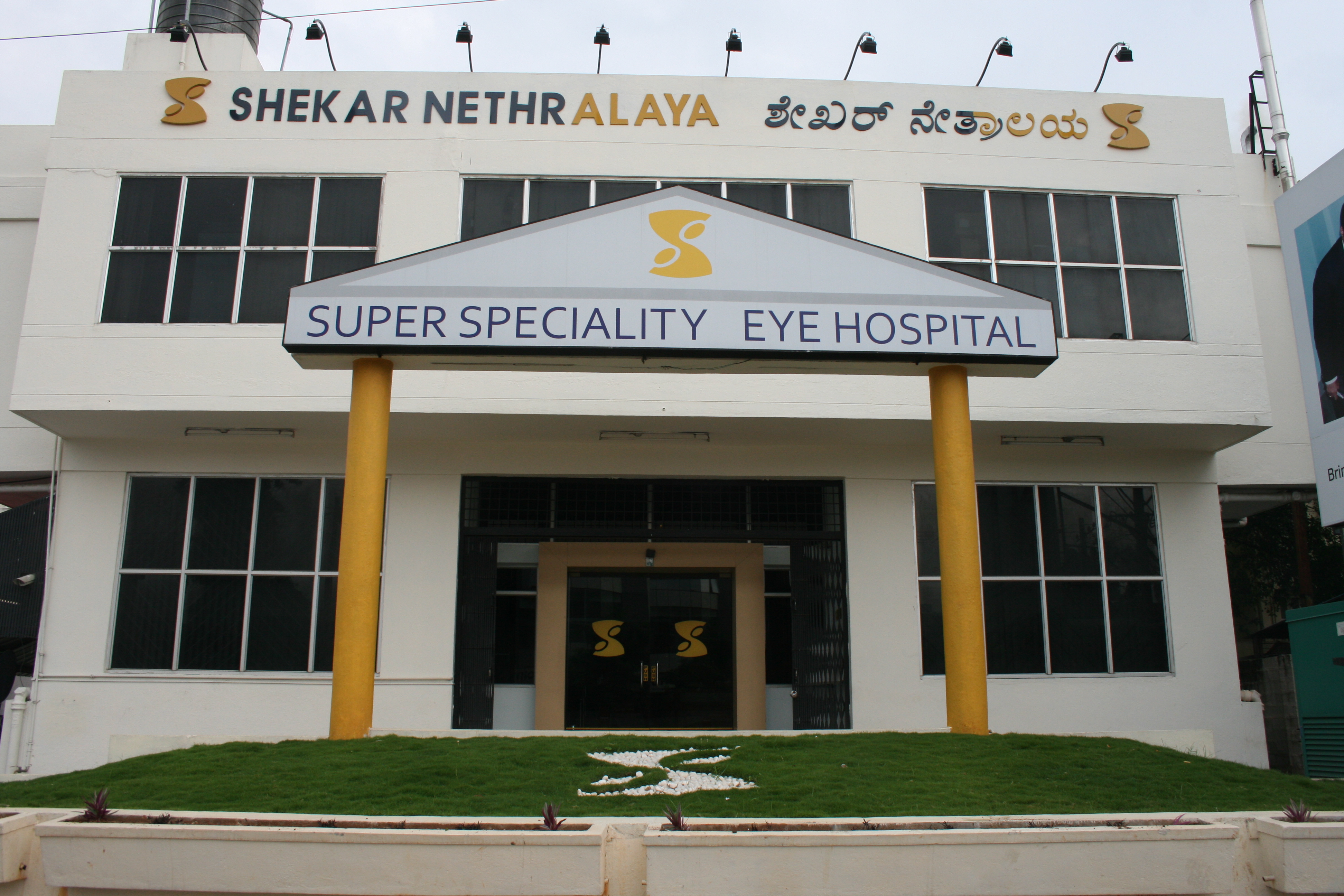
- Address – 633, 100 Feet Ring Road, J.P. Nagar – 3rd Phase, Bengaluru – 560078.
- Phone no – +91-99805 62020
- Email – info@shekareyehospital.com
Shekar Eye Hospital was established in 1999. They have a mission to provide good eye care services to people worldwide, and they place a premium on quality, efficiency, and dependability. The accreditation was obtained by the National Board of Hospitals and Health Care Providers. It is one of the most important ophthalmic care communities.
They specialise in cataract, LASIK, and refractive surgery, diabetic eye care, glaucoma therapy, squint correction, and paediatric Opthalmology.
The clinic’s founder, Dr. Rajashekar Y L, has conducted over 30,000 eye procedures. Dr Vivek M Bhaskar Shailesh GM is a senior consultant who is in charge of a team of ten doctors.
Over two lakh people have been treated, and over 20,000 surgeries of varied degrees of complexity have been performed.
10. Minto Eye Hospital
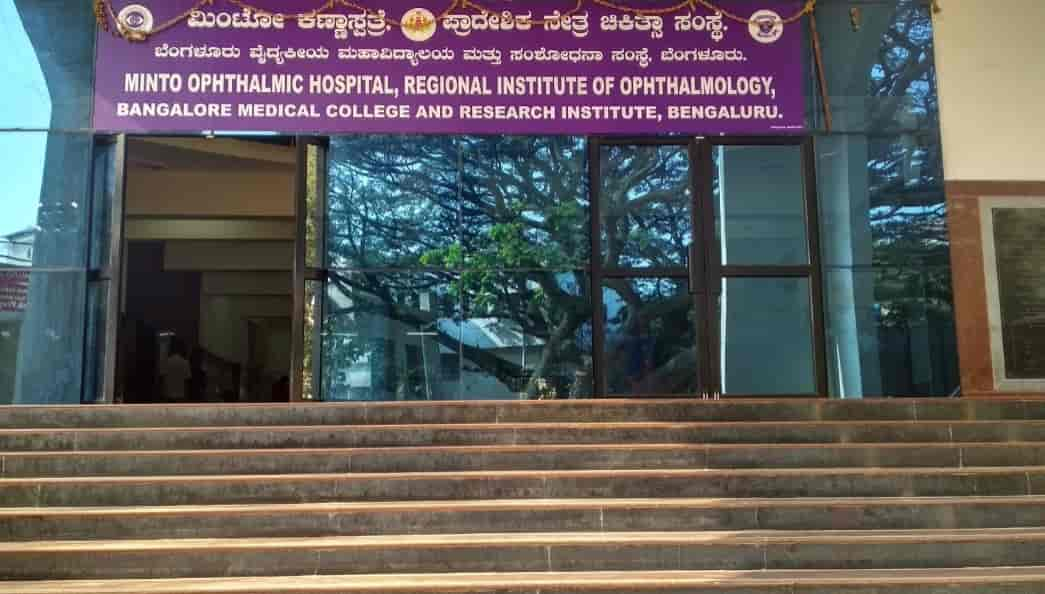
- Address – A.V. Road, Opp Central Police Station, Chamrajpet, Bengaluru, Karnataka – 560002
- Phone no – 080 2670 7176
Mysore Education Society established the BMCRI in 1955. Minto Eye Hospital, which specialises in ophthalmology, was founded in 1913. It is one of the world’s oldest eye specialist hospitals. For the ophthalmology unit, there are 300 beds.
They also have a vitreoretinal centre, a glaucoma clinic, a squint clinic, and an eye bank.
Dr Ravi Prakash is an ophthalmologist with extensive experience as an adept eye surgeon. They had to deal with an unusual case of proptosis in a newborn.
Conclusion
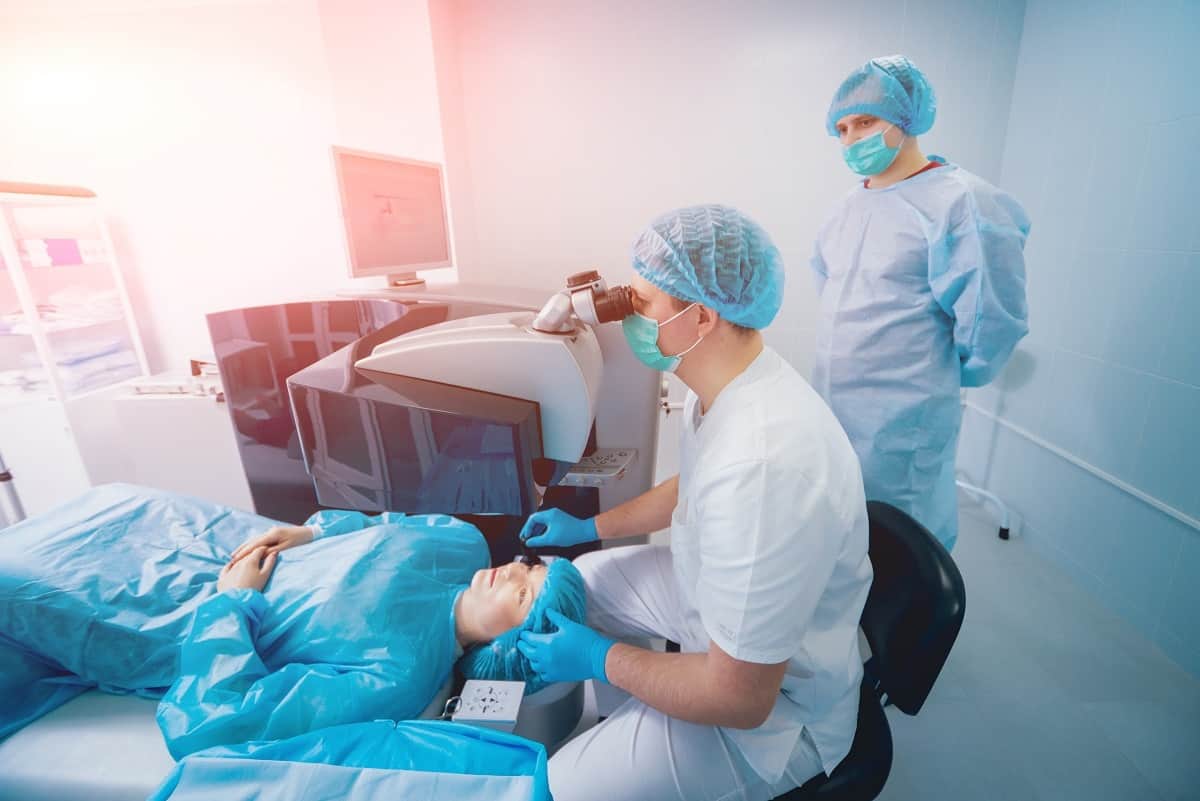
Ophthalmologists are medical practitioners who have received specialised training in diagnosing and treating eye and visual disorders. They carry out a variety of medical and vision exams, as well as minor office procedures and surgeries.
Some ophthalmologists specialise in a particular discipline of ophthalmology that deals with specific operations, sections of the eye, or patient populations.
When a person has eye or vision problems, they are frequently sent to an ophthalmologist by their family doctor, paediatrician, or emergency department doctor. They refer to people who have symptoms or signs of illnesses that need to be treated or monitored.
You should see an ophthalmologist if you have a higher risk of eye disorders or health conditions frequently contributing to visual problems.
Article proofread & published by Gauri Malhotra.

